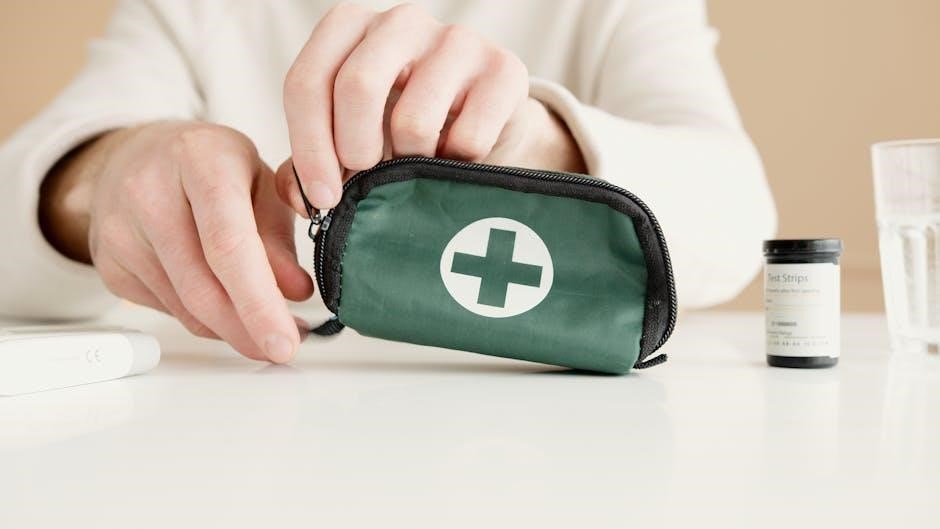First Aid Psychiatry is a concise, clinically oriented guide tailored for medical students and professionals. It offers essential insights into psychiatric diagnoses, treatments, and exam preparation strategies, ensuring a solid foundation for both clinical practice and academic success.
Importance of First Aid Psychiatry
First Aid Psychiatry is a vital resource for medical students and professionals, offering a structured approach to understanding psychiatric concepts. It bridges the gap between theoretical knowledge and practical application, making it indispensable for clerkships and exams. The guide emphasizes key diagnoses, treatments, and clinical strategies, ensuring a strong foundation for patient care. Its concise, bullet-point format allows for efficient review and retention of critical information. By focusing on high-yield topics, it helps learners identify and manage mental health conditions effectively. This resource is particularly valuable for preparing for shelf exams and real-world clinical scenarios, making it a cornerstone for success in psychiatry training.

Key Concepts in Psychiatry Clerkship
First Aid Psychiatry covers essential topics like psychiatric diagnoses, treatments, and exam preparation strategies, providing a practical and concise guide for clinical practice and academic success.

Examination and Diagnosis in Psychiatry
First Aid Psychiatry emphasizes the importance of a thorough psychiatric examination, including a detailed history and mental status assessment. Key components such as appearance, behavior, speech, mood, thought process, cognitive function, and insight are highlighted. The guide provides structured frameworks for documenting findings and correlating them with clinical diagnoses. Practical tips are offered for conducting interviews effectively, ensuring accurate assessments. This section also outlines common pitfalls to avoid during examinations, helping students and professionals refine their diagnostic skills. The content is designed to align with clinical rotations and shelf exams, making it an invaluable resource for mastering psychiatric evaluation techniques.
Psychotic Disorders: Overview and Management
First Aid Psychiatry provides a comprehensive overview of psychotic disorders, focusing on schizophrenia and its subtypes. It details key symptoms, diagnostic criteria, and management strategies. The guide emphasizes early recognition of hallucinations and delusions, along with cognitive and functional impairments. Treatment approaches include antipsychotic medications, adjunct therapies, and psychosocial interventions. Practical tips for differentiating between psychotic and other psychiatric conditions are also included. The content is structured to aid students in understanding the nuances of these disorders, ensuring effective patient care and exam success. This section serves as a quick reference for clinical rotations and high-yield exam preparation.
Mood Disorders: Depression and Bipolar Disorder
First Aid Psychiatry extensively covers mood disorders, focusing on major depressive disorder and bipolar disorder. It outlines diagnostic criteria, clinical presentations, and treatment options. For depression, the guide highlights key symptoms such as persistent sadness and anhedonia, while for bipolar disorder, it emphasizes manic and hypomanic episodes. Management strategies include pharmacotherapy with antidepressants and mood stabilizers, psychotherapy, and lifestyle modifications. The resource also provides tips for distinguishing between depressive and bipolar episodes, ensuring accurate diagnoses. This section is designed to equip students with a clear understanding of mood disorders, enhancing both clinical skills and exam performance.
Treatment Options in Psychiatry
First Aid Psychiatry provides a comprehensive overview of treatment options for various psychiatric conditions. Pharmacotherapy remains a cornerstone, with detailed sections on antidepressants, antipsychotics, and mood stabilizers. The guide emphasizes evidence-based approaches, including dosing guidelines and potential side effects. Psychotherapy is also highlighted, with strategies like cognitive-behavioral therapy (CBT) and psychodynamic therapy. Additionally, the resource covers adjunctive treatments such as electroconvulsive therapy (ECT) and lifestyle modifications. Practical tips for initiating and monitoring treatments are included, ensuring a patient-centered approach. This section equips students with the knowledge to develop effective treatment plans, aligning with both clinical practice and exam preparation needs.
Legal and Ethical Considerations in Psychiatry
First Aid Psychiatry emphasizes the importance of understanding legal and ethical principles in clinical practice. Key topics include patient confidentiality, informed consent, and the rights of individuals with mental illnesses. The guide addresses involuntary treatment laws and the ethical challenges of balancing patient autonomy with societal safety. It also covers issues like capacity assessment and the role of psychiatrists in court proceedings. Practical advice is provided on navigating these complex scenarios, ensuring adherence to ethical standards while delivering compassionate care. These insights are essential for students and professionals to make informed decisions in real-world clinical settings.
Communication Skills for Mental Health Assessment
Effective communication is crucial in psychiatric evaluations. First Aid Psychiatry highlights the importance of active listening, empathy, and clear verbal cues to build rapport with patients. Key skills include maintaining a non-judgmental attitude, using open-ended questions, and validating patients’ experiences. Cultural sensitivity and awareness of nonverbal cues are also emphasized to ensure accurate assessments. The guide provides practical tips for de-escalating agitation and engaging patients with cognitive impairments. Mastering these skills enhances diagnostic accuracy, fosters trust, and supports therapeutic relationships. These strategies are essential for students and clinicians to effectively navigate mental health assessments and deliver patient-centered care.

Exam Preparation Strategies
First Aid Psychiatry offers tailored strategies for exam success, including mnemonics, practice questions, and integrated mini-cases. It emphasizes focused review, active learning, and simulation exercises to master key concepts and clinical scenarios, ensuring confidence and readiness for psychiatry exams.
Mnemonics and Tips for Shelf Exam Success
Mnemonics and tips in First Aid Psychiatry are designed to simplify complex concepts, aiding retention and recall during exams. Bullet-point formats and clinical pearls highlight key diagnoses, treatments, and differentials. Practice with integrated mini-cases and UWorld questions enhances application. Mnemonics like “SIGECAPS” for depression and “CATEGO” for schizophrenia streamline learning. Tips include active recall, spaced repetition, and focusing on high-yield topics. Anki flashcards and sketchy videos complement studying. Emphasizing common exam traps and clinical vignettes prepares students for shelf exams effectively. These strategies ensure a structured, efficient approach to mastering psychiatry clerkship material and excelling on exams.
Integrated Mini-Cases for Clinical Application
First Aid Psychiatry incorporates integrated mini-cases to bridge theory and practice. These concise, real-world scenarios simulate clinical encounters, covering diagnoses like depression, anxiety, and psychosis. Each case presents patient histories, symptoms, and lab findings, followed by step-by-step analyses. Students practice identifying key symptoms, differential diagnoses, and treatment plans. The cases enhance problem-solving skills and confidence in managing psychiatric conditions. They also highlight common exam topics, ensuring readiness for clinical rotations and assessments. By mimicking actual patient interactions, these mini-cases provide practical learning opportunities, reinforcing essential concepts and promoting clinical competence.
Best Practices for Psychiatry Shelf Exam Preparation
First Aid Psychiatry offers evidence-based strategies for excelling on the shelf exam. Focus on high-yield topics, such as mood disorders, psychotic disorders, and common psychopharmacological agents. Utilize active learning techniques like creating flashcards and engaging in group discussions. Practice with sample questions from reliable sources, such as UWorld, to familiarize yourself with exam formats. Dedicate time to reviewing mnemonics and clinical pearls highlighted in the guide. Simulate test conditions during practice sessions to improve time management. Prioritize understanding concepts over rote memorization, as this enhances clinical application. Regular review of the First Aid Psychiatry PDF ensures comprehensive coverage of key material, maximizing your score and clinical competence.

Recommended Resources
First Aid Psychiatry PDF is a top resource, offering high-yield content, mnemonics, and clinical pearls. Additional textbooks and online tools like UWorld and Case Files complement exam preparation effectively.
First Aid Psychiatry PDF: A Comprehensive Guide
First Aid Psychiatry PDF is a trusted resource designed for medical students and professionals, offering a structured approach to understanding psychiatric concepts. Organized in bullet points, it covers diagnoses, treatments, and exam strategies, making it ideal for quick review. The guide includes clinical pearls, mnemonics, and integrated mini-cases to enhance learning. Its concise format ensures that readers can grasp key information efficiently, while the inclusion of the latest research and clinical perspectives keeps it up-to-date. Suitable for both clerkship preparation and long-term reference, this PDF is a valuable tool for anyone aiming to excel in psychiatry. It complements other study materials like UWorld and Case Files, providing a well-rounded approach to mastering the field.
Additional Textbooks for Psychiatry Clerkship

Beyond the First Aid Psychiatry PDF, several textbooks are highly recommended for a comprehensive understanding of psychiatry. Case Files Psychiatry offers real-life clinical scenarios to enhance problem-solving skills. Psychiatry: PreTest provides practice questions that simulate shelf exams, aiding in self-assessment. Kaplan and Sadock’s Synopsis of Psychiatry is a detailed textbook that covers the full spectrum of psychiatric disorders. Additionally, The Maudsley Prescribing Guidelines is invaluable for pharmacology in psychiatry. These resources complement the First Aid Psychiatry PDF by offering in-depth knowledge and practical applications, ensuring a well-rounded preparation for both clinical rotations and exams.
Mastering First Aid Psychiatry ensures success in clinical rotations and exams, providing a comprehensive guide to psychiatric diagnoses, treatments, and exam strategies.
Final Thoughts on Excelling in Psychiatry Clerkship

Excelling in the psychiatry clerkship requires a combination of clinical acumen, effective communication, and strategic exam preparation; The First Aid Psychiatry PDF serves as an indispensable resource, offering a concise yet comprehensive overview of key concepts, diagnoses, and treatment strategies. By mastering the mnemonics, integrated mini-cases, and evidence-based approaches outlined in this guide, students can confidently navigate both clinical rotations and high-stakes exams. Additionally, the emphasis on ethical considerations and patient-centered care ensures a well-rounded understanding of psychiatric practice. Leveraging this resource alongside active learning techniques and practical experience will empower students to achieve academic success and deliver compassionate, competent care in real-world settings.